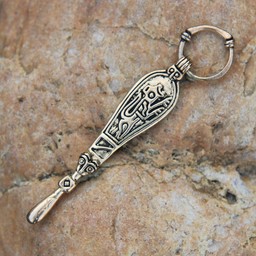Product description
This decorated Viking ear spoon is based on a 9th–10th century original found in grave 507 in the Viking town of Birka. Ear spoons were essential cosmetic tools and are found in great variety in the graves of Viking women. Often, they were carried together with tweezers. This ear spoon is decorated, as they served not only a cosmetic function but also acted as ornamental objects.
The figure depicted on this ear spoon may represent a Valkyrie holding a drinking horn. The wolf motifs symbolize Fenrir, the son of Loki.
Viking women placed great value on decorated ear spoons and nail-cleaning sets, while men took pride in their ornate combs. Christian sources often expressed astonishment at the hygiene of the Vikings, who regularly washed and kept themselves clean. This practice had a religious foundation: unlike Christianity, in pagan belief one was not constantly watched by a god. Instead, the gods were approached at intentional, sacred moments. Ritual communication with the gods required cleanliness and beauty, including a well-groomed appearance. In this religion, beauty symbolized order, while filth represented chaos. This contrast was also reflected in the myth of Ragnarök, the final chaos. During Ragnarök, the ship Naglfar arrives, made from the nails of the dead. Long, dirty nails were believed to contribute to this looming chaos. In Iceland, it was even forbidden to look upon a sacred site before performing ritual washing.
Details:
Material: Bronze
Length: 7 cm
Width: 1,8 cm
Based on a historical original
Transport weight (gram): 300 *
This item is produced in limited quantities only. This means that every piece is unique. Sizes & finish may vary lightly from piece to piece.
Packaged with 100% recycled material
When packaging this item, we exclusively use 100% recycled plastic and recycled paper/cardboard from FSC certified forests. We reuse a large part of the material directly without the intervention of a recycling process.
Recycle the material by separating your waste:
1. Cardboard: separate or reuse your paper.
2. Plastic cushions, clothing bags and plastic tape: separate or reuse your plastic. If possible, pierce the cushions with a volume reduction needle.
3. Paper packaging for jewelry and small items: these have a plastic inner layer. Remove these, then separate your paper and plastic.
















